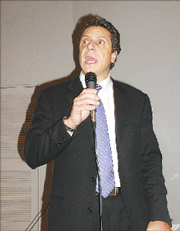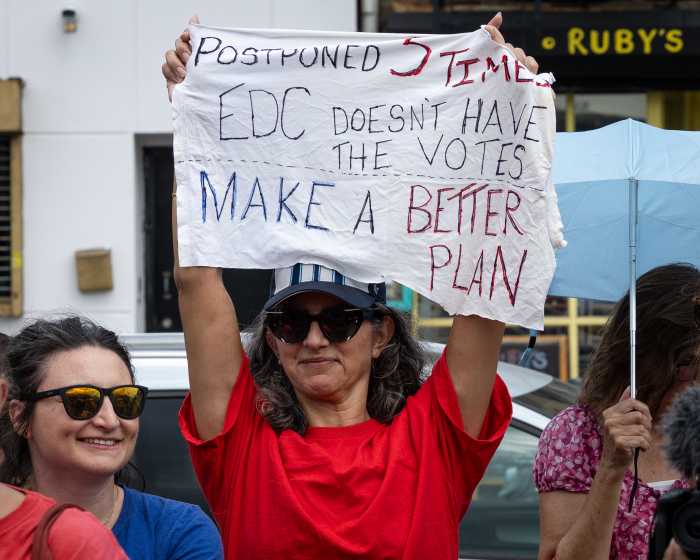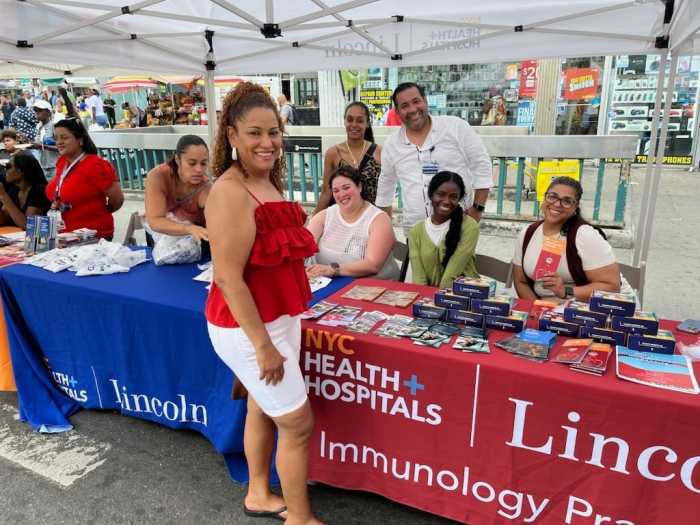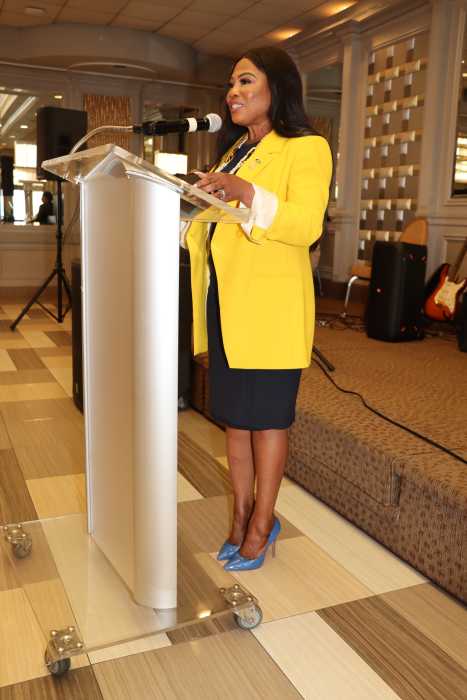Asked at the conclusion of a 30-minute interview to summarize the key elements in his pitch for gay and lesbian votes, Andrew Cuomo, one of four Democrats competing in the September 12 Democratic Primary for state attorney general, tailored two of his standard campaign themes to specific LGBT interests but led off by invoking the enormous advantages within the community he carried into the race.
“Look at the leaders of your community who understand these issues and what it takes to make a difference,” he responded. “The argument can be made that their opinion is important.”
Cuomo, the former Clinton administration housing secretary, then mentioned by name endorsements from City Council Speaker Christine Quinn and state Senator Tom Duane, both Chelsea Democrats who signed on early this year, before the contest had even heated up. He could also have mentioned support from West Village Assemblywoman Deborah Glick, Lower East Side Councilwoman Rosie Mendez, and lobbyist Emily Giske, who serves as vice chair of both the state Democratic Party and his election committee.
Cuomo’s support from these officials quickly led to an early endorsement by the Gay and Lesbian Independent Democrats, one of the city’s oldest queer political clubs where Glick, Duane, Quinn, and Giske, in particular, have long wielded significant clout.
These developments were particularly noteworthy given that the race also includes an openly gay candidate, Sean Patrick Maloney, a former senior White House aide to President Bill Clinton, and the city’s ex-public advocate, Mark Green, an outspoken gay rights supporter going back two decades who had strong gay backing in his 2001 race for mayor and a 1998 bid for the U.S. Senate. All three of the contenders are same-sex marriage supporters. (Charlie King, a civil rights attorney and non-profit housing administrator who also supported marriage equality, dropped out of the race on Tuesday.)
Maloney had the greatest success battling back in a big way among LGBT activists, winning support from the Empire State Pride Agenda, Brooklyn’s Lambda Independent Democrats, the Stonewall Democratic Club of New York City, the Out People of Color Political Action Club and Karen Burstein, the out lesbian 1994 Democratic attorney general candidate.
Green’s inroads into the LGBT community this year have been more modest, winning endorsement from the smaller Jim Owles Liberal Democratic Club and the Queens Lesbian and Gay Democratic Club, though he also enjoys the support of Ethan Geto, a powerful political consultant who managed Howard Dean’s 2004 campaign in New York State.
Cuomo’s early success with LGBT leaders has been echoed by the broader rallying around his candidacy by the Democratic Party establishment, particularly in the wake of its state convention, where only Cuomo won an automatic place on the September ballot. That allowed him to bypass the cumbersome process of gathering petition signatures. The son of former three-term Governor Mario Cuomo, he has maintained a lead in the polls all year and currently shows a double-digit advantage over Green, his closest rival. His list of supporters—including three Manhattan congressmembers, Jerrold Nadler, Charles Rangel, and Carolyn Maloney, and his father’s longtime nemesis, former Mayor Ed Koch—dwarfs any other candidate’s.
Still, the near-unanimity of support for Cuomo among gay elected officials was striking and may have had a critical effect on Green’s game plan, which surely depended on his traditional strength with LGBT voters. Those clubs disinclined to support Cuomo may have found it more palatable to go with favorite son Maloney than to antagonize the frontrunner by endorsing his most formidable opponent, Green.
In fact in touching on the other two themes he brings to gay voters, Cuomo emphasized his advantages over Green while seeking to neutralize his opponent’s potential strengths with LBGT voters.
Focusing on the question of experience and résumé, Cuomo argued, “This is not a matter of opinion. It is an exercise in objectivity,” pointing out that he has experience in state government, as a top aide to his father; in Washington, as the federal housing secretary, who took a department that some congressional Republicans wanted to eliminate and, in four years, increased its budget by 50 percent; and in the non-profit sector, where he founded Housing Enterprise for the Less Privileged, or HELP, in 1986.
“Who has been in the state government?” he said. “It would be helpful if you know the state government.”
Cuomo went on to emphasize that while heading up Housing and Urban Development in Washington he initiated 2,000 anti-discrimination suits and said that challenge was every bit as difficult as policing the state’s Medicaid program, which earlier in the interview he had addressed in talking about health care for people living with AIDS.
The other major theme Cuomo emphasized clearly took aim at Green’s strength as an advocate for progressive social goals, and implicitly addressed the sense some voters may have that Green has been more out-front on LGBT issues.
“What do you think the job is?” Cuomo said. “What do you want the attorney general to do? My view of government is very distinct. I believe that government is not an academic exercise. I believe it is a practical agent for change.”
He continued, making a more explicit appeal on LGBT issues.
“[Government] is not about just fighting the good fight, it is also about winning. Who can help pass a same-sex marriage law?… Your community needs a friend, needs a fighter, but more than that, a fighter who can get the changes done.”
Cuomo next raised, without prompting, the fact that four years ago, when he ran unsuccessfully for the Democratic gubernatorial nomination, he voiced support for civil unions rather than marriage equality.
“I told you then that as a goal and practical reality today, the answer is civil unions,” he said about the political realities of 2002. “I want to articulate the ideal and I also believe in the achievement of the goal… Let’s operate on two levels. Let’s always articulate and push for the optimal goal and let’s get something done today.”
Then, in explaining why he has amended his position to support marriage rights for same-sex couples, he said, “ Is what can get done today more than four years ago? Yes.”
Cuomo’ explanation, in fact, squares neatly with what he said in 2002.
“I don’t think gay marriage is doable in this current window with this current Legislature,” he told Gay City News at the time. “I do think civil unions is doable…. If you were just articulating the progressive vision, it would be gay marriage.”
It is also true that while Green came out for marriage equality earlier than Cuomo—in the run-up to his 2001 mayoral race—he was not there on the issue either three years earlier when he ran for the Senate.
Where Cuomo does differ with both Green and King––though significantly not Maloney––is that he would have responded to the marriage equality lawsuits at the Court of Appeals earlier this year in the same way incumbent Attorney General Eliot Spitzer did, by defending the state law that does not allow for unions of same-sex couples.
“The attorney general defends the state. Not just when he wants to, not when it’s politically popular,” Cuomo said. “The facts, the law is clear. Now sometimes in the political campaign, the facts can be muddied.”
He said the only time that would not be the case would be a situation where any attorney would recuse themself—when “it’s unethical, when it’s frivolous or only meant to harass, when there is a conflict of interest.”
Asked specifically whether he would step back from representing the state if his analysis found that existing law was constitutionally flawed—a position argued by Charlie King—Cuomo said, “ No. You’re not a super-legislator. You’re not a super-governor.”
He went to say, though, that he agreed with Spitzer’s 2004 advisory opinion that same-sex marriages legally entered into in other jurisdictions, such as Canada, should be recognized by New York State and he would represent that perspective in court. State Comptroller Alan Hevesi and Mayor Michael Bloomberg relied, in part, on Spitzer’s advisory to extend spousal pension benefits to gay couples married out-of-state as well any with Vermont or Connecticut civil unions. On the other hand, three New York courts as well as Pataki administration income tax officials have ruled against such an interpretation, so Cuomo’s commitment on this point could well be tested.
On other issues of critical concern to the LGBT community, Cuomo argued that his anti-discrimination efforts at HUD proved he has “the creativity in legal arguments, in terms of standing up, and in results” to tackle systemic problems of bullying in the schools. He also said that his success in overseeing 30,000 vendors in the federal housing program would enable him to oversee 20,000 in the state Medicaid program to root out “bad providers, I mean the crooks” without imperiling the delivery of needed services to low income clients, including thousands living with AIDS.
Asked about his differences with Spitzer––who all year has enjoyed a commanding lead in the polls in the governor’s race––over reinstating a death penalty law, Cuomo emphasized the work he did during the 12 years of his father’s administration in staving off a legislative override of the governor’s death penalty vetoes. In the years since he left Washington, the younger Cuomo has expended considerable effort not only on forestalling a new death penalty law to replace the Pataki statute thrown out by New York’s highest court, but also on efforts at reform of the draconian Rockefeller-era drug laws.
Asked to respond to criticism made in the New York Times endorsement of Green about his stewardship at HUD, Cuomo said he would not “respond to The Times, because there will be other endorsements,” but said, “On the record at HUD, I never said when I left HUD it was perfect.”
But, he emphasized, he oversaw a $30 billion agency and a $50 billion portfolio of housing assets, which, he claimed, “every objective source” found he had made “ significant progress at reforming.”
“Did we make progress?” Cuomo said. “ Yes. Was it perfect when you left? No… Can you turn the arrows around? Yes.”
gaycitynews.com






























